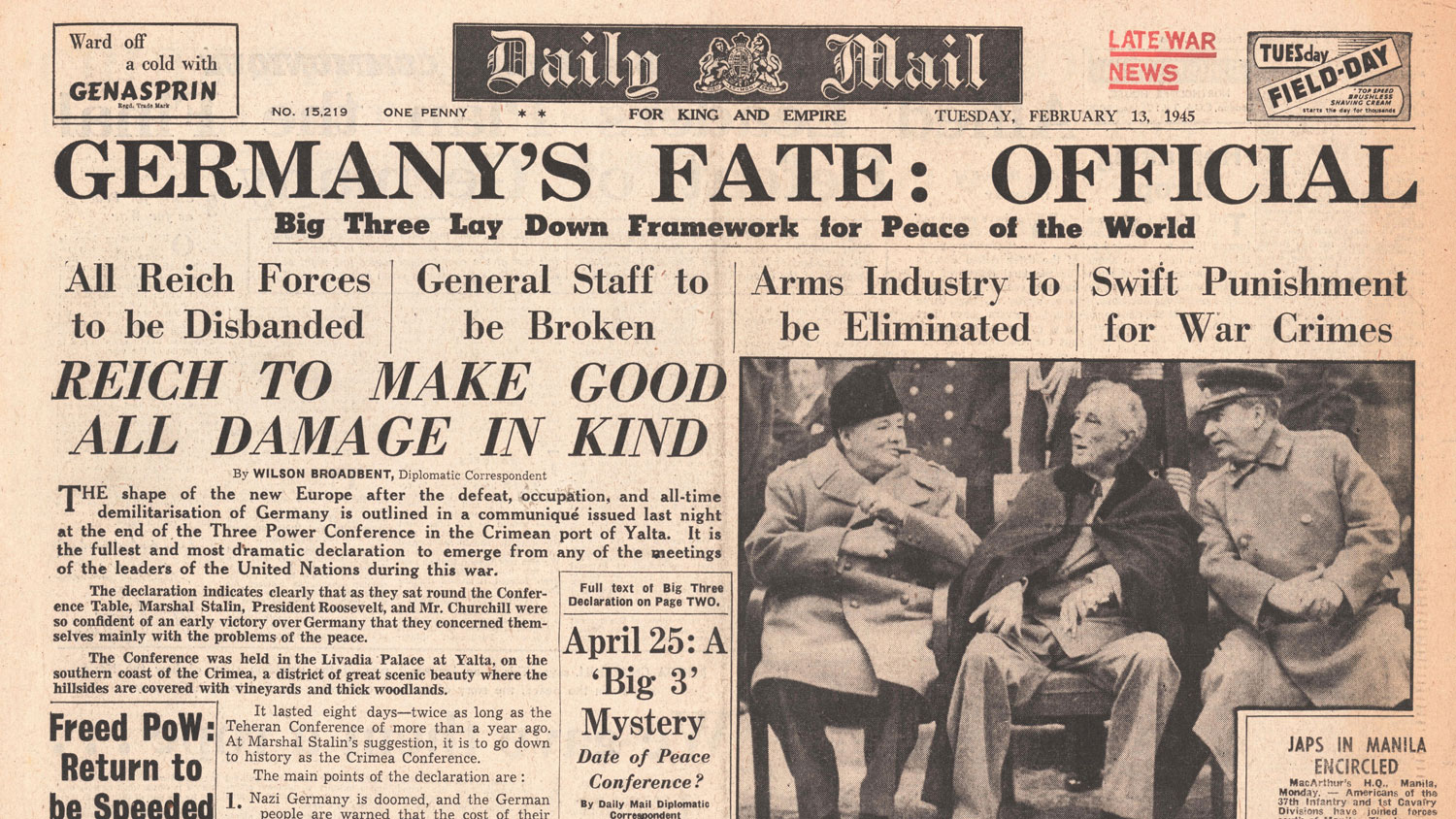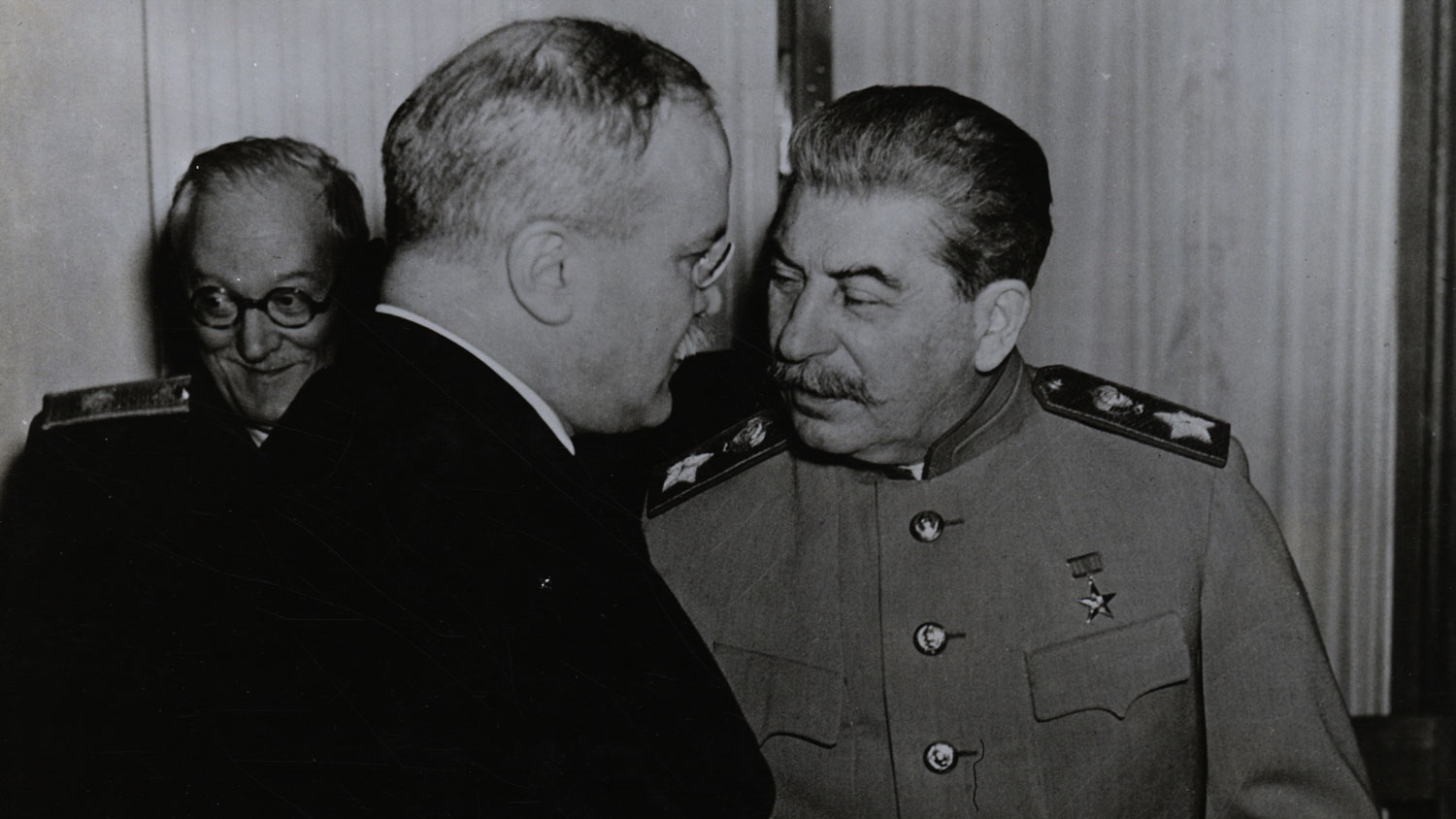Yalta: How Churchill, Roosevelt and Stalin planned to carve up post-war Europe
Today marks 80 years since a historic meeting took place that brought together the leaders of three of the Allied powers during the Second World War – Winston Churchill, Franklin D Roosevelt and Joseph Stalin – with the hope of a brighter future for everyone.
The Yalta Conference, held at the Livadia Palace in modern-day Ukraine, was a turning point in global diplomacy and would shape the world we know today.
In a joint statement following the meeting, the three leaders did not hold back, saying: "Nazi Germany is doomed.
"The German people will only make the cost of their defeat heavier to themselves by attempting to continue a hopeless resistance."
At the Yalta Conference, Prime Minister Winston Churchill, US President Franklin D Roosevelt and Premier of the Soviet Union Joseph Stalin – often referred to as the 'Big Three' – joined forces to discuss the future of Europe and the world following the defeat of Hitler and his brutal, totalitarian regime.
However, each leader had their own goals, so the meeting would never be straightforward.
Churchill was concerned with the balance of power in Europe, particularly in Central and Eastern Europe and the preservation of British influence in the region.

A couple of weeks after the conference, Churchill provided an update to MPs in the House of Commons regarding what was discussed at Yalta such as plans for a new international organisation aimed at ensuring peace and security after the Second World War – the United Nations.
He said: "Joined with other states, both large and small, we may found a world organisation which, armed with ample power, will guard the rights of all states, great or small, from aggression, or from the gathering of the means of aggression.
"I am sure that a fairer choice is open to mankind than they have known in recorded ages.
"The lights burn brighter and shine more broadly than before.
"Let us walk forward together."
Despite being ill, Roosevelt travelled to Yalta to secure the creation of the United Nations.
Of Roosevelt's health during the meeting, Churchill's doctor wrote: "The president looked old and thin and drawn.
"He sat looking straight ahead with mouth open as if he were not taking things in."
Mr Roosevelt died two months later.
A month before his death, Roosevelt spoke of the success of the Yalta Conference to the US Congress, saying: "We know, of course, that it was Hitler's hope... that we would not agree – that some slight crack might appear in the solid wall of allied unity, a crack that would give him and his fellow gangsters one last hope of escaping their just doom.
"That is the objective for which his propaganda machine has been working for many months. But Hitler has failed.
"Never before have the major allies been more closely united – not only in their war aims but also in their peace aims."
Stalin's aim was to expand Soviet control in Eastern Europe, ensuring that the country would be a dominant force to be reckoned with.
In response to Roosevelt's speech about unity against Hitler, Stalin said: "It is not so difficult to keep unity in time of war since there is a joint aim to defeat the common enemy, which is clear to everyone.
"The difficult task will come after the war when diverse interests will tend to divide the Allies.
"It is our duty to see that our relations in peacetime are as strong as they have been in war."

At the conference in Yalta, the leaders made several key decisions that would shape the future.
The division of Germany
It was agreed that, upon Germany's surrender, the country would be divided into four zones of occupation, controlled by the UK, the US, the Soviet Union and France.
It was also vital to rid the world of Nazism and the joint statement made that very clear, saying: "It is our inflexible purpose to destroy German militarism and Nazism and to ensure that Germany will never again be able to disturb the peace of the world."
However, perhaps to reassure German civilians who, like the rest of the world, were equally horrified by Hitler's actions, another line was added.
It said: "It is not our purpose to destroy the people of Germany, but only when Nazism and militarism have been extirpated will there be hope for a decent life for Germans, and a place for them in the comity of nations."
The creation of the United Nations
The leaders committed to founding the United Nations (UN), designed to, among other things, maintain international security by the removal of threats to peace.
The UN was to have a Security Council with permanent members, including the UK, the US, the Soviet Union, China and France, each having veto power.
Eighty years later, the UN is made up of 193 member states.
The war against Japan
Stalin promised that the Soviet Union would join the war against Japan within three months of Germany's defeat.
In exchange, Stalin was given land in East Asia, including the return of territories lost in the Russo-Japanese War of 1904-1905.
Poland and Eastern Europe
One of the most controversial issues was the fate of Poland and Eastern Europe.
Stalin pushed for Soviet-backed communist governments in the region, while Churchill and Roosevelt sought to ensure free elections and democratic governments.
Ultimately, the leaders agreed that Poland would have a government that included both communist and non-communist elements.
This arrangement would ultimately turn out to be unsatisfactory for the West, as Stalin's control over the region went from strength to strength.
What went wrong?
Although the leaders agreed on free elections, Stalin's actions revealed he would not keep that promise.
The Soviet Union solidified its control over Eastern Europe, establishing lasting communist regimes.
Critics argue that Churchill and Roosevelt gave in too much to Stalin, allowing an unnecessary expansion of Soviet influence.
This division of Europe marked the start of the Cold War, which shaped international relations for decades.
Eighty years on
While some of the agreements made at Yalta were short-lived, others, like the creation of the United Nations, survived.
However, despite Churchill and Roosevelt's positive speeches following the conference, Yalta was a starting point, not the fix to the world's future problems.
To mark the 40th anniversary of the Yalta Conference, then-President Ronald Reagan released a statement, saying: "The reason Yalta remains important is that the freedom of Europe is unfinished business.
"Those who claim the issue is boundaries or territory are hoping that the real issues – democracy and independence – will somehow go away. They will not."
When the three leaders were drawing up their plans to reorganise Europe, few at the time could probably have imagined what would become of Yalta itself 80 years on.
While Yalta is on the southern tip of Crimea it has not been hit by any of the land battles taking place inside either Ukraine or Russia.
But the city is around 50 miles from Sevastopol, which has been hit several times, including some big strikes by British Storm Shadow missiles.
Yalta itself was apparently hit by a precision missile last May, so it has been targeted, albeit fairly lightly.









